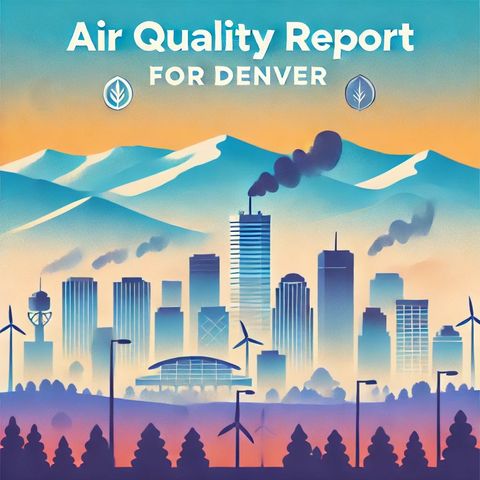Moderate Air Quality in Denver Raises Concerns

Download and listen anywhere
Download your favorite episodes and enjoy them, wherever you are! Sign up or log in now to access offline listening.
Moderate Air Quality in Denver Raises Concerns
This is an automatically generated transcript. Please note that complete accuracy is not guaranteed.
Description
Today, the air quality in Denver is a critical topic of concern for residents and visitors alike. As of this morning, Denver's Air Quality Index, or AQI, has been reported...
show moreSeveral factors contribute to today's air quality in Denver. One of the main pollutants impacting the AQI is particulate matter, specifically PM2.5 and PM10. These are tiny particles in the air that can be inhaled and cause health problems, particularly for sensitive groups like children, the elderly, and those with respiratory conditions such as asthma or chronic bronchitis.
Additionally, ground-level ozone plays a significant role in Denver's air quality. Ozone at ground level is formed when pollutants emitted by cars, power plants, industrial boilers, refineries, chemical plants, and other sources chemically react in the presence of sunlight. This is particularly problematic on hot, sunny days when the conditions are just right for ozone to accumulate.
Weather patterns today are also influencing Denver's air quality. A high-pressure system over the region has caused a temperature inversion, where a layer of warm air traps pollutants near the ground, preventing them from dispersing. This phenomenon tends to worsen as the day progresses and temperatures increase, leading to higher pollution levels in the afternoon and early evening.
Wildfires in the western United States are another significant contributor to Denver's air quality concerns. Smoke from these wildfires can travel vast distances, carrying fine particulate matter that degrades air quality not only in Denver but across large swathes of the country. This afternoon, wind patterns are expected to bring some light smoke from these wildfires into the Denver area, potentially causing a spike in particulate matter levels.
Despite these challenges, steps can be taken to mitigate exposure to unhealthy air. Residents are advised to limit strenuous outdoor activities during times when the AQI is high, especially in the late afternoon and evening. Keeping windows closed and using air purifiers can also help maintain indoor air quality. For those with chronic health conditions or heightened sensitivity to air pollutants, wearing a mask designed to filter out particulate matter can provide added protection when outdoor activities are unavoidable.
Furthermore, community efforts to reduce emissions can play a significant role in improving air quality. Using public transportation, carpooling, reducing the use of gas-powered lawn equipment, and supporting policies aimed at reducing industrial emissions can collectively make a difference.
In conclusion, while Denver's air quality today remains within the moderate range, it is essential for residents to stay informed and take appropriate precautions, particularly those who are more vulnerable to the effects of air pollution. By understanding the current air quality situation and contributing to efforts that reduce pollution, Denverites can help promote a healthier environment for all.
Information
| Author | QP-5 |
| Organization | William Corbin |
| Website | - |
| Tags |
Copyright 2024 - Spreaker Inc. an iHeartMedia Company
